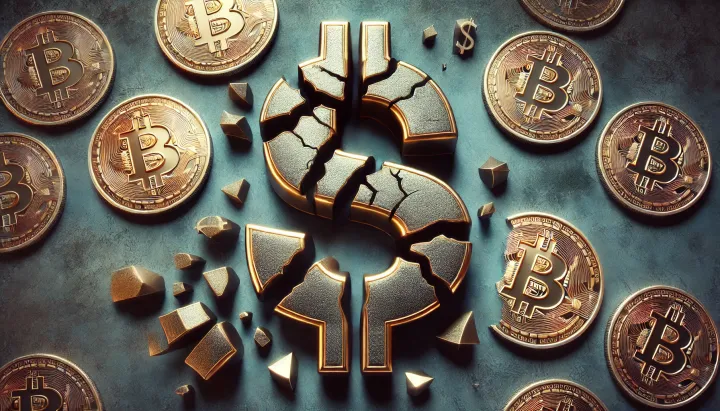Stories, Bank Runs, and Bitcoin Literacy
The April 25, 2025 episode of The Bitcoin Way features author Devin Rose, who shows how thriller fiction can turn digital-bank-run risks and inflationary bailouts into vivid lessons that steer families, schools, and churches toward Bitcoin self-custody.

- My 'briefing notes' summarize the content of podcast episodes; they do not reflect my own views.
- They contain (1) a summary of podcast content, (2) potential information gaps, and (3) some speculative views on wider Bitcoin implications.
- Pay attention to broadcast dates (I often summarize older episodes)
- Some episodes I summarize may be sponsored: don't trust, verify, if the information you are looking for is to be used for decision-making.
Summary
The April 25, 2025 episode of The Bitcoin Way features author Devin Rose, who shows how thriller fiction can turn digital-bank-run risks and inflationary bailouts into vivid lessons that steer families, schools, and churches toward Bitcoin self-custody. Rose critiques altcoin governance, promotes a dual gold-Bitcoin hedge, and outlines how classical education and faith communities foster low-time-preference habits. His narrative spotlights the policy urgency of deposit-insurance reform, curriculum innovation, and clear rules for nonprofit Bitcoin treasuries.
Take-Home Messages
- Narrative Catalyst: Thriller fiction converts abstract banking fragility into public motivation for Bitcoin adoption.
- Self-Custody Training: Youth saving experiments build low-time-preference habits and expose counterparty risk.
- Faith Treasury Hedge: Multisig Bitcoin holdings let congregations preserve purchasing power amid debasement.
- Altcoin Governance Warning: Premine and proof-of-stake structures introduce centralization and exit-risk hazards.
- Dual-Haven Strategy: Pairing gold’s stability with Bitcoin’s upside tempers volatility during the monetary transition.
Overview
Devin Rose links the 2023 Signature and Silicon Valley collapses to future digital bank runs, arguing that limitless bailouts will further erode dollar confidence. Fictionalizing such events widens the audience, turning technical jargon into emotional stakes that move policy debate forward. Legislators often act only after stories resonate with voters.
Anecdotes about Rose’s teenage son—who tripled early Bitcoin savings—illustrate how volatility drills low-time-preference discipline. Rose argues that experiential learning outperforms textbooks in cultivating financial resilience. He predicts youth programs that use real Bitcoin balances will accelerate grassroots literacy.
Rose condemns Ethereum’s premine and proof-of-stake pivot as evidence that many altcoins cannot fulfill sound-money promises. Speculative marketing, he warns, lures retail investors away from hard-asset balance-sheet protection. Clear risk guidelines are urged to help savers exit fragile tokens before contagion spreads.
The conversation shifts to faith and education. Rose is launching Chesterton Academy to embed Bitcoin economics within classical rhetoric and virtue courses while promoting multisig church treasuries. He argues that stewardship teachings already justify inflation hedges, and secure governance models could unleash broad community momentum.
Stakeholder Perspectives
- Regulators: Redesign deposit insurance to curb moral hazard without criminalizing self-custody.
- Educators: Test Bitcoin-based savings labs as tools for teaching economics, rhetoric, and ethics.
- Faith Leaders: Balance doctrinal stewardship with operational security when adopting Bitcoin tithes.
- Retail Savers: Seek guidance on hedging inflation through dual gold-Bitcoin positions while managing tax exposure.
- Portfolio Managers: Compare risk-adjusted returns of gold-Bitcoin blends against traditional 60/40 allocations.
Implications and Future Outlook
Narrative-driven awareness could hasten legislative scrutiny of emergency-bailout powers and stimulate demand for self-custody safeguards. Jurisdictions that harmonize deposit-insurance reform with individual sovereignty may retain capital, while others face flight to Bitcoin. Regulators delaying clarity risk sudden liquidity shocks.
Embedding Bitcoin in classical curricula shifts cultural norms toward saving and skepticism of deficit finance. Over time, such cohorts may pressure governments to justify money printing and explore hybrid reserve models blending Bitcoin and gold. Education policy therefore becomes a stealth battleground for monetary reform.
Faith-based multisig treasuries create local proof-of-concepts that policymakers cannot ignore. Their success or failure will influence nonprofit accounting standards, charitable tax codes, and wider institutional adoption. Early movers may set templates that scale internationally.
Some Key Information Gaps
- How can regulators redesign deposit insurance to minimize moral hazard without stifling self-custody? Developing balanced frameworks is crucial for financial stability and individual sovereignty.
- Which classroom activities best instill low-time-preference behaviors using real Bitcoin savings? Effective pedagogy will shape future consumer behavior and voter attitudes toward monetary policy.
- What governance structures enable faith communities to manage multisig treasuries securely? Robust models could unlock significant grassroots capital and demonstrate nonprofit use cases.
- Under what macro scenarios does a gold-Bitcoin mix outperform pure Bitcoin holdings on a risk-adjusted basis? Portfolio research informs household, pension, and endowment strategies during monetary transition.
- Which proof-of-work architectures can secure non-monetary networks without excessive energy overhead? Exploring new utilities broadens Bitcoin’s societal value and addresses environmental critiques.
Broader Implications for Bitcoin
Monetary Narrative Arms Race
Successful thrillers that dramatize bank-run chaos will push central banks to enhance transparency and curb emergency printing. As public literacy rises, political tolerance for stealth inflation declines. Governments may adopt partial Bitcoin reserves to maintain credibility.
Civic Resilience Through Education
Classical schools embedding Bitcoin concepts create citizens who question deficit spending and demand accountable governance. This shift could realign electoral incentives toward long-term fiscal responsibility. Regions investing early in such curricula may gain competitive human-capital advantages.
Decentralized Faith Finance
Churches that master multisig stewardship can become local safe-haven hubs during economic shocks. Their example may inspire other nonprofits to follow, amplifying community-level adoption. Regulators will face pressure to craft clear, favorable rules for charitable Bitcoin holdings.



Comments ()